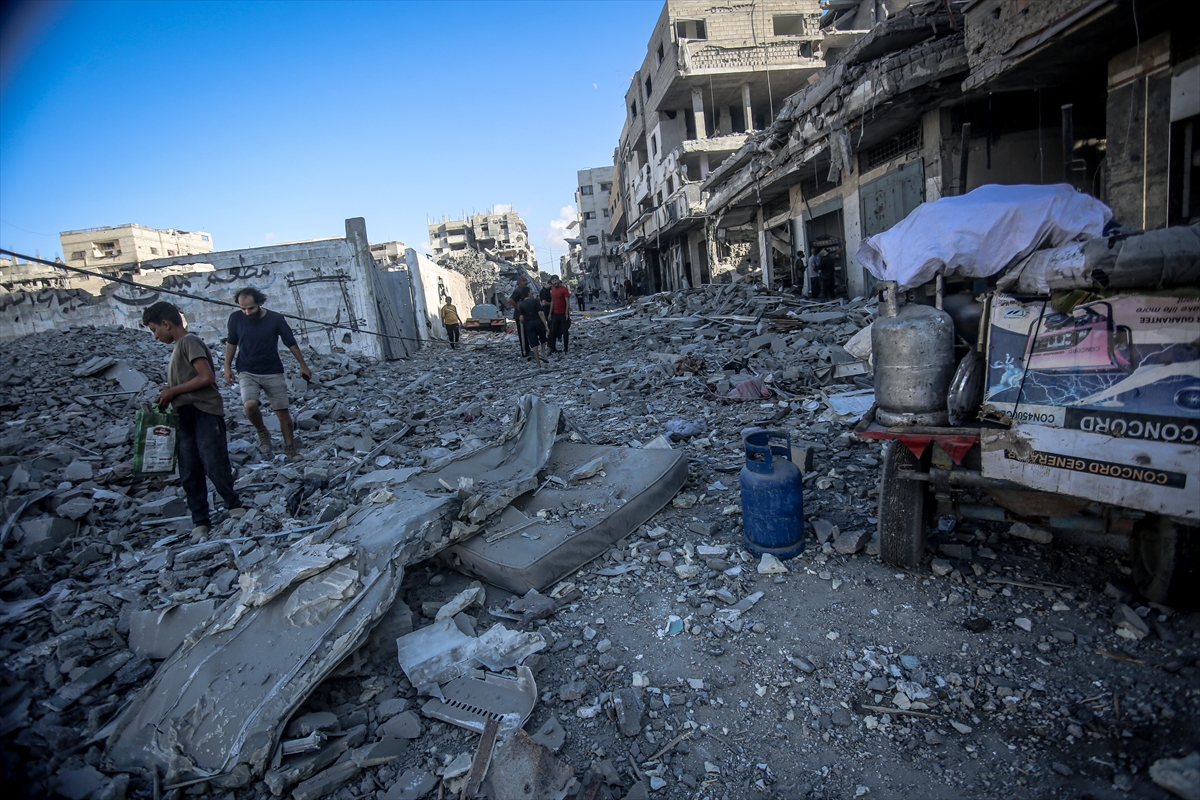
By A Correspondent
London, (The Muslim News): Palestine Authority (PA) has welcomed US President Donald Trump’s efforts to end the ongoing war in Gaza, reaffirming its commitment to work with Washington and other parties to achieve lasting peace.
On Monday, President Trump outlined a 20-point plan at a joint press conference with Israeli Prime Minister Benjamin Netanyahu. The proposal’s key provisions are ending Israel’s war on Gaza, releasing Israeli captives in exchange for Palestinian prisoners, completely disarming Hamas, and creating a technocratic, non-political Palestinian committee to administer Gaza.
“The State of Palestine welcomes the sincere and determined efforts of President Donald J Trump to end the war on Gaza and affirms its confidence in his ability to find a path toward peace,” the official Palestinian news agency Wafa quoted a PA presidency statement as saying. The statement stressed the importance of partnership with Washington in achieving regional stability and renewed Palestine’s “joint commitment to work with the United States, regional states, and partners to end the war on Gaza through a comprehensive agreement.”
The Palestinian presidency stated the agreement should secure humanitarian aid delivery, arrange the release of all hostages and prisoners, introduce civilian protection mechanisms, and obtain a full Israeli withdrawal from Gaza. It would also unify Palestinian territories and institutions across Gaza, the West Bank, and East Jerusalem, and lead to a two-state solution, creating a sovereign Palestinian state living next to Israel in security and peace, according to international legitimacy.
However, the proposal faces immediate hurdles. Hamas has not yet endorsed the deal, and Palestinians were reportedly excluded from initial negotiations. Egypt and Qatar have reportedly delivered the US ceasefire proposal to Hamas, with the group stating it is “reviewing the proposal positively and objectively.”
Yet Israeli Prime Minister Netanyahu expressed a conflicting interpretation of the plan, insisting that Gaza would be demilitarised under Israeli security supervision and governed by a civilian administration “neither by Hamas nor by the Palestinian Authority”. He also said there would not be an Palestinian State and that Israeli troops will stay in Gaza.
The plan has received support from several countries, including Saudi Arabia, Jordan, the UAE, Qatar, Egypt, Turkey, Indonesia, Italy, France, and the United Kingdom. Foreign ministers from these nations released a joint statement welcoming Trump’s “sincere efforts to end the war in Gaza” and reaffirming their readiness to work with the US toward a comprehensive deal that ensures humanitarian aid, prevents displacement, secures hostages’ release, and lays the groundwork for a two-state solution.
The White House later provided further details, stating that Trump’s plan would transform Gaza into a “deradicalized”, “terror-free zone” and focus on redevelopment for residents’ benefit. If both parties agree, the plan would immediately halt all hostilities, Israeli forces would withdraw to agreed positions, with a suspension of all military operations during the phased withdrawal. Within 72 hours of Israel’s acceptance, all hostages would be returned.
The plan also proposes the release of 250 life-sentence prisoners and 1,700 Gazans detained after October 7, 2023, with a stipulation that for every returned Israeli body, Israel would release the bodies of 15 Gazans killed in the conflict. Hamas members who commit to peaceful coexistence and decommission their weapons would be granted amnesty, while those wishing to leave Gaza would be provided safe passage.
Humanitarian aid would flow immediately upon acceptance of the plan, distributed via the UN, the Red Crescent, and other neutral parties, with quantities meeting levels agreed in a prior January 19 accord, including infrastructure rehabilitation and entry of debris removal equipment. The Rafah border crossing into Egypt would operate under the same mechanism.
Gaza’s governance under the plan would be handled by a technocratic, apolitical Palestinian committee comprising local and international experts, supervised by an international transitional body chaired by President Trump and other world leaders. Hamas’ military infrastructure would be dismantled under independent observation, with an international stabilisation force working alongside Israel and Egypt to ensure border security.
The White House also highlighted a Trump-led economic development plan to rebuild Gaza, creating a special economic zone with preferential tariffs and access rates, while guaranteeing freedom of movement for those wishing to leave or return. The plan includes interfaith dialogue initiatives and aims to establish a credible pathway toward Palestinian self-determination and statehood.
Amid these developments, diplomatic tensions continue. Israeli Prime Minister Netanyahu expressed regret to Qatari Prime Minister Mohammed bin Abdulrahman Al Thani over a recent missile strike in Doha that killed a Qatari serviceman. The apology was made during a trilateral call with President Trump, with Al Thani welcoming assurances that such attacks would not recur and emphasizing Qatar’s ongoing role in regional security.
Despite these high-level diplomatic exchanges, the devastating humanitarian toll in Gaza continues to mount. A ministry statement said that 50 bodies were brought to hospitals in the last 24 hours, while 184 people were injured. Since October 2023, at least 66,055 Palestinians have been killed, with 168,346 injured, according to the Health Ministry. Many victims remain trapped under rubble as rescue operations struggle to reach them. Israeli military operations continue, with five Israeli soldiers reported severely injured in northern Gaza on Monday, while attacks across the enclave killed dozens of civilians, destroyed homes, and forced hundreds of families to flee.
From Gaza City to refugee camps across the central and southern strip, airstrikes, artillery shelling, and booby-trapped vehicle detonations have left a trail of destruction. The Al-Shifa Medical Complex has been effectively besieged, preventing access for patients and staff, while areas such as Al-Nasr Street, Zeitoun, Al-Sabra, and Al-Rimal neighbourhoods continue to bear the brunt of the Israeli ground offensive, Operation “Gideon’s Chariots 2”, aiming to occupy the city.
[Photo: Palestinians search their belongings among the rubble of buildings destroyed by an Israeli attack on Abu Hasira street in Gaza City, Gaza on September 30, 2025.
Photojournalist: Saeed M. M. T. Jaras/AA]